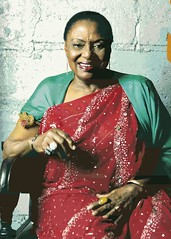
Miriam Makeba in publicity photo. Known internationally as "Mama Africa", she performed at the 80th birthday celebration for Cuban President Fidel Castro.
Originally uploaded by Pan-African News Wire Photo File
MARIAM MAKEBA VISITS RAPE SURVIVORS IN CONGO
Singer and activist Miriam Makeba will visit rape survivors in the Democratic Republic of Congo during a four day visit to the country's capital.
Makeba arrived in Kinshasa on Thursday and will visit small farming projects designed to help rape survivors feed their families and increase self-reliance.
Said Makeba: "The Democratic Republic of the Congo faces a triple tragedy of physical, psychological and social damage, undermining the country's attempts to improve living conditions."
Makeba, who is a United Nations Food and Agriculture (FAO)
ambassador, said support for women was crucial for the nation's improvement amid fragile peace.
The seeds, tools and agricultural training used on the farms were provided by the FAO.
Makeba described the systematic rape of women in recent years as the "most horrifying feature of the complex emergency" in the country.
"Women guarantee the survival of 80 percent of the households in DRC. Yet despite their crucial role for the wellbeing of the family, they are frequently victims to rape and sexual violence," she said.
"In the province of North Kivu alone, 27 000 cases of sex violence were recorded in 2006."
Makeba said she hoped her visit would be an opportunity to
strengthen and renew international commitment to the ongoing crisis in the DRC.
UNITED NATIONS 13 March 2008 sapa-AFP
ARMED REBELS IN DRCONGO ORDERED TO DISARM OR FACE UN SANCTIONS
The Security Council on Thursday demanded that all armed groups in eastern Democratic Republic of Congo (DRC) lay down their arms immediately or face expanded UN sanctions.
The council unanimously adopted a French-drafted resolution
demanding that those groups "immediately lay down their arms" and report to DRC authorities and the UN mission in DRC (MONUC) for their disarmament, repatriation and resettlement.
Resolution 1804 also insists that the armed Rwandan Hutu rebels "immediately stop recruiting and using children, release all children associated with them and put an end to gender-based violence, particularly rape and other forms of sexual abuse."
It recalled the UN sanctions, including a travel ban and an asset freeze, targeting political and military leaders of those groups and warned that the 15-member council would consider extending those punitive measures to other members of the factions or persons providing other forms of aid to them if needed.
France's UN Ambassador Jean-Maurice Ripert hailed the unanimous adoption of the resolution which he said "clearly condemns the illegal activities, military operations and violence against the civilian population, especially women and children" by armed groups bent on destabilizing DRC.
"We are threatening them" with "further sanctions if needed," Ripert told reporters.
"We want them to disarm and join the process of peace in DRC and we want also to address the issue of talks between Congolese parties and also we are supportive of the process of peace talks and reconciliation between Rwanda and DRC."
MONUC estimates the number of armed Rwandans, who politically call themselves the Democratic Forces for the Liberation of Rwanda (FDLR), at around 6,000 men, living in the Nord-Kivu and Sud-Kivu eastern border provinces.
Last month, the Kinshasa government announced plans to get rid of foreign fighters still in the country in coming months, with the help of MONUC.
The Rwandan rebels, who have been in eastern DRC near the border for almost 14 years, are widely viewed as the main threat to security in the Great Lakes region of Africa.
The government of neighbouring Rwanda accuses some of these Hutus of having taken part of that small country's genocide in April-July 1994, when the United Nations estimates that about 800,000 people, mainly minority Tutsis, were killed.
MONUC, which is helping DRC recover from the 1998-2003 civil war that drew in more than half a dozen other African armies-still maintains more than 17,000 personnel in the country.
In November, representatives of DRC and Rwanda met in Nairobi and signed a joint statement under which the Congolese government committed itself to draw up a plan to disarm and repatriate Rwandan rebels either voluntarily or by force.
This plan was submitted to the Rwandan government in December and provided for an interim period of preparing the fighters to go home before a resumption of military operations against them.
No comments:
Post a Comment